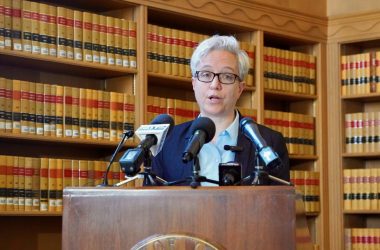The Biden administration and federal agencies are prepared to remove four lower Snake River dams to save imperiled salmon species, according to a leaked proposal among parties in a federal lawsuit and the administration’s environmental council.
Republican representatives in the Northwest, as well as some electric utilities, are not pleased about the proposed agreement.
The willingness to consider removing the dams and to invest at least $1 billion during the next decade in habitat restoration and alternative energy development on tribal lands in the Columbia Basin was revealed in a leaked 34-page proposed agreement of commitments by the federal government to save endangered Columbia Basin fish. It was first reported by the online news site Clearing Up on Tuesday and then released Wednesday by Republican lawmakers.
The Snake River is the main tributary of the Columbia River, flowing from Idaho and eastern Washington into Oregon. The four dams provide irrigation and emissions-free hydropower for nearby communities, but they have also contributed to the near extinction of 13 salmon and steelhead species that return to the Columbia Basin from the Pacific Ocean to spawn, according to the National Oceanic and Atmospheric Administration.
Oregon congressman Cliff Bentz, a Republican who opposes removing the dams, joined four other state Republican congressional representatives from Idaho and Washington in writing to President Joe Biden on Wednesday, asking for clarity on some of the proposed actions – which include the possibility of removing the Snake River dams – and where replacement power would come from.
“It is imperative that our constituents, whose livelihoods depend on the Columbia River system, have a comprehensive understanding of this document’s contents,” they wrote, “so they can anticipate and prepare for the wide-ranging impacts that will inevitably be felt across the region should the commitments detailed in this document be realized.”
Years-long negotiations
The proposal is the result of more than two years of negotiations among the federal Council on Environmental Quality, the Biden administration’s environmental advisors, and parties represented by the nonprofit Earthjustice, which sued the federal government in 2021 over its dam operations on the Snake River and their threat to those 13 salmon and steelhead runs. The downstream effects of the dams also hurt southern resident orcas off the coasts of British Columbia, Washington and Oregon that rely on salmon for food and are listed as endangered. Earthjustice is representing 10 conservation and fishing groups, with support from the state of Oregon and the Nez Perce Tribe. The federal agencies named in the lawsuit include the U.S. Army Corps of Engineers, Bureau of Reclamation, Bonneville Power Administration, Fish and Wildlife Service and the National Marine Fisheries Service.
Lawyers at Earthjustice and Shannon Wheeler, chair of the Nez Perce, have said publicly that the four dams on the lower Snake River should be removed. The loss of river water that’s used to irrigate crops and the growth of farmland in the area have reduced salmon runs along with overfishing, rising water temperatures and the adverse impact from hatcheries and hatchery fish.
All parties agreed to put the lawsuit on pause in 2021, and to negotiate a plan to save the fish. After several extensions, the parties recently reached the proposed agreement, which was to be filed in federal court on Dec. 15. It is still unclear who initially leaked the agreement, according to Elizabeth Manning, a spokesperson for Earthjustice.
She said the group and its lawyers will continue following federal mediation rules that require confidentiality while talks are ongoing.
“We cannot provide any detail beyond what is in the filings with the court,” Manning said in an emailed statement. She said Earthjustice lawyers still plan to submit the proposal in court Dec. 15 and, if all parties don’t agree to move forward, Earthjustice and the litigants it represents will restart their 2021 lawsuit.
The commitments
Among the commitments proposed by federal officials in the draft are more than $1 billion in investments to develop alternative sources of renewable energy in the Columbia Basin, particularly for tribal communities, as well as investments in fish passage improvements, habitat restoration and hatcheries. When it comes to removing the four dams, the proposal’s authors wrote: “The science is clear, and now so too must be our path forward.”
The authors, citing a 2022 National Oceanic and Atmospheric Administration study, wrote that without dam removal and habitat restoration on the Snake River, the likelihood of extinction for 13 salmon and steelhead runs is “moderate to high.”
“We agree that business as usual – and the consequential disappearance of salmon and other native fish populations in the Columbia River Basin – is unacceptable. And while there is still time to save these fish, there is no time to waste,” they said.
as usual – and the consequential disappearance of salmon and other native fish populations in the Columbia River Basin – is unacceptable. And while there is still time to save these fish, there is no time to waste,” they said.
Republican opponents
Bentz, as well as Reps. Russ Fulcher, R-Idaho; Cathy McMorris Rodgers, R-Wash.; and Dan Newhouse, R-Wash.; submitted three pages of questions to Biden following their review of the proposal. They expressed concern about where alternative energy would come from for Columbia Basin communities and whether the new energy sources would reduce the independence of the Bonneville Power Administration. They said the proposal lacked the clarity they needed to make a decision, and reminded Biden that Congress would be the ultimate vote on removing dams.
“Due to the document’s use of vague and imprecise language, it appears susceptible to misinterpretation,” they said.
Kurt Miller, executive director of Northwest RiverPartners, an industry group representing community-owned electric utilities in Oregon, Washington, Idaho, Montana, Utah, Nevada and Wyoming, called the proposal “one sided.” Northwest RiverPartners is a Vancouver-based third party involved in the case on the part of the federal agencies. The negotiations have been criticized for not including electric utilities customers who would potentially pay higher prices for alternative forms of energy if the dams and the hydropower they supply are ended.
“Anti-hydropower groups determining the future of hydropower is not a good idea and that’s what this agreement is at its core,” Miller said.
Manning of Earthjustice said it’s possible to provide power to the region and keep fish species from disappearing.
“Our goal has long been to reach a comprehensive solution that would prevent salmon extinction, restore the Columbia River Basin ecosystem and replace the services now provided by the dams so the Pacific Northwest can chart a more sustainable and resilient future,” she wrote.
Washington State Standard reporter Jerry Cornfield contributed to this report.




